Tuesday, February 22, 2005
 Sheikh Nahayan Ben Mubarak Al Nahyan, Minister for Higher Education and Chancellor of Higher Colleges of Technology, welcomed hundreds of college students from around the world to the third E-ducation without Borders conference in Abu Dhabi earlier this week. Speakers included Nobel laureates Murray Gell-Mann and Carlo Rubbia, Boeing chairman Lew Platt, the BBC's Tim Sebastian, Frank Fahey, Gilly Salmon, Sam Pitroda, David Ignatius of the Washington Post...and me.
Sheikh Nahayan Ben Mubarak Al Nahyan, Minister for Higher Education and Chancellor of Higher Colleges of Technology, welcomed hundreds of college students from around the world to the third E-ducation without Borders conference in Abu Dhabi earlier this week. Speakers included Nobel laureates Murray Gell-Mann and Carlo Rubbia, Boeing chairman Lew Platt, the BBC's Tim Sebastian, Frank Fahey, Gilly Salmon, Sam Pitroda, David Ignatius of the Washington Post...and me. The real stars of the show were the students, who earned the right to attend by submitting papers on e-ducation without borders and related subjects. I talked with students from Italy, the Czech Republic, China, India, the U.S., Australia, Canada, Brazil, Peru, and many other lands. Sheikh Nahayan set three objectives for the conference: build new strategies for e-ducation, reflect on strategies developed for the 2001 and 2003 conferences, and continue to grow the Global Student Forum.
The real stars of the show were the students, who earned the right to attend by submitting papers on e-ducation without borders and related subjects. I talked with students from Italy, the Czech Republic, China, India, the U.S., Australia, Canada, Brazil, Peru, and many other lands. Sheikh Nahayan set three objectives for the conference: build new strategies for e-ducation, reflect on strategies developed for the 2001 and 2003 conferences, and continue to grow the Global Student Forum.The United Arab Emirates (UAE) was founded only 35 years ago, although its people have lived here since 5500 BC. The UAE has a population of 4 million on 83,600 square kilometers. Abu Dhabi is far and away the largest and richest of the sevent emirates of the UAE.
One man, Sheikh Zayed ben Sultan al Nahyan, heir to a 350-year dynasty, founded the country and inspired its growth from sand dunes to skyscrapers. A thoroughly enlightened man, Sheikh Zayed championed education as the pathway to success. Sheikh Zayed passed away last year, an almost unimaginable tragedy. In American terms, it was as if George Washington, Thomas Jefferson, John F. Kennedy, FDR, Ben Franklin, and Abraham Lincoln had all perished on the same day. Memories of Sheikh Zayed are everywhere. An Austrian folk-rock group, Paper Moon, sang a tribute ballad, Zayed, that became the unofficial anthem of the conference.
For seven thousand years, the people here have welcomed travelers into their tents. Today's tent may be the brand-new Emirates Palace Hotel, awe-inspiring in scale and beauty. Where most hotels would have signs, the Emirates Palace has beautiful people from around the globe in stylish waistcoats, welcoming guests and pointing the way. On the first evening of the conference, a thousand of us sat at tables alongside the Gulf to listen to an inspirational talk from an astronaut and watch a fireworks extravaganza before feasting on endless heaps of exotic food.
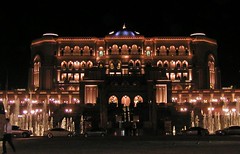
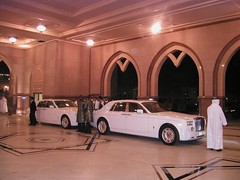
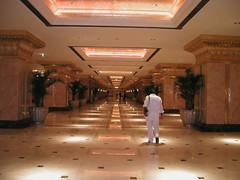
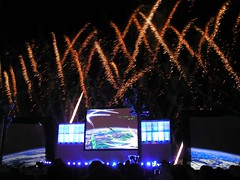
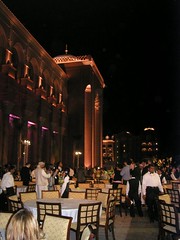
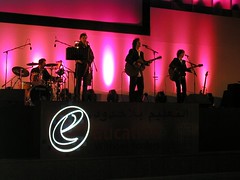

The next evening we ventured 90 minutes into the desert to put on native costume, watch traditional dances, roam the dunes in over-powered four-wheel drives, ride camels, witness a mock-wedding procession, chow down on goat and baby camel, listen to an orchestra flown in from Vienna, and once more listen to Paper Moon sing Zayed.
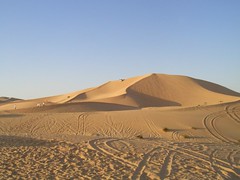
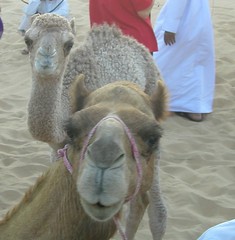
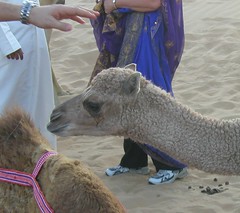
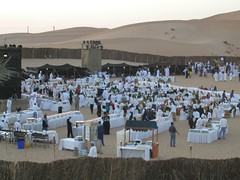
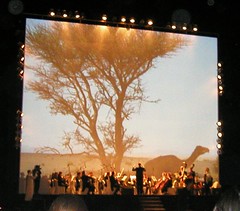
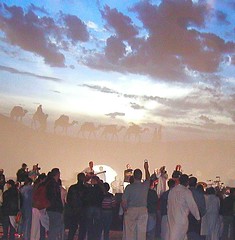
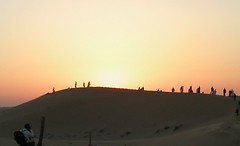





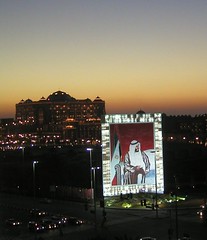




1 Comments:
Hi Jay,
I was there at the conference. It was truly awesome and I thoroughly enjoyed your presentation. I was shocked to read of your heart attack but pleased you are OK.
Post a Comment
<< Home